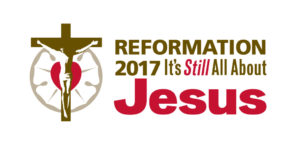Celebrating the 500th anniversary of the protestant reformation
This October, the celebration we’ve waited 500 years for is here. We get to sing the praises of a figure from history who revolutionized culture and left an indelible mark on the world. We recognize a man who believed all people should have access to the Word of God. We celebrate the reformer who taught salvation is God’s free gift, not a result of earning heavenly favor with your good behavior. We spotlight a humble teacher whose message was so radical, the most powerful religious and political authorities of the day conspired to have him silenced even by assassination. We honor the one who was made an outlaw, as religious elites teamed up with governmental powers to get rid of him and his teachings. We look to the man who trusted his Father’s provision, even under the looming specter of death. We hold up the man whose boldness, faithfulness, and uncompromising stand for the Gospel remains the bedrock of our church – we celebrate the man, Jesus Christ.

Sorry if you were expecting someone else: this reformation anniversary is not about a German monk with a funny haircut; it’s about the Savior of humanity who comes with salvation for all who believe. It’s about freedom from sin, death, and from the twisted doctrines of the church that attempted to put Jesus in the shadows. It’s about the Gospel that says Jesus paid the full price for your sinfulness, no penance or indulgences necessary. It’s about the democratization of the Word, putting the scriptures and worship back into the hands and lips of all believers. It’s about a fundamental reimagining of faith as what God does for you instead of what you do for God.
About the reformation
Christian churches around the world celebrate and remember the historic events of the Protestant Reformation and the man whose courage sparked it into flame 500 years ago. Martin Luther’s principled stand against the selling of grace by the church of his day has become a turning point in story of Christianity. He championed a message of God’s goodness and love freely given to all people accomplished and demonstrated through the perfect life, unjust death, and miraculous resurrection of Jesus, the Son of God. This good news, or Gospel, was rooted in what was then a radical idea: the authority of the Bible, which thanks to Luther and others was being made available in the common languages of Europe for the first time. The Reformation irrevocably changed everything about the way Christians and the church understood God and His purpose at work in human history by restoring scriptural truths of a free and freeing grace established by Jesus.
The message of the Gospel and the giving of God’s free gift of love in Jesus are still alive every week at Christ the Redeemer Lutheran Church and millions of churches around the world where these truths, rooted in biblical authority, are proclaimed and celebrated.
Reformation Values:
Freedom
With the Reformation came a new concept of personal and religious freedom. Today, freedom tends to mean a desire for more choices. The Reformation understanding of freedom delves much deeper into the human condition. True freedom comes through the Gospel of Jesus Christ, and it is in embracing this good news that a person experiences freedom from three things: sin, death, and the power of the devil. This good news assures us that in Jesus, God has completed all that is needed for our salvation, and therefore we are free to live in God’s grace. The Reformation understanding of freedom brought with it a tremendous responsibility. As Luther said “A christian is a perfectly free lord of all, subject to none. A christian is a perfectly dutiful servant of all, subject to all.” While being set free from sin, death and the power of the devil, the believer is now free to be bound by God through the Holy Spirit to righteousness. Freedom means we are now free to love and serve God and our communities without fear or worry.
Grace
The Reformation understanding of grace is simple. It is God’s unmerited favor on account of the work He has done in Jesus. God’s grace wishes us well. God’s grace justifies us, that is, it freely grants us the faith which alone justifies. The fruit of justifying faith is love. Therefore, this liberating grace is outside of us and is from, through, and originating in God alone. Grace can only be given freely by God to the most undeserving and unworthy people and can never be earned by efforts, endeavors or works; otherwise it would not be grace. The Reformation taught that grace comes through Jesus Christ from the beginning until the end, that day when He comes in His Glory.
Education
A celebration of the Reformation is by definition a celebration of and a rallying cry for education. While Marin Luther was primarily concerned with the world to come, he had many things to say about education. With the support of a new technology, the Gutenberg printing press, Luther’s translation of the Bible into the common language of German, and his insistence on providing instruction to churches and families with written materials, lead to a massive growth in literacy and common education throughout Europe. Luther and the Reformation took learning beyond the confines of universities and cloisters so that even remote, rural churches became “Word Houses” that provided the freedom of learning, with reading and writing as a core components of growing in the knowledge of God through Scripture.
It just so happens that a famous quote from our countries founding fathers was inspired by Martin Luther the reformer, “If a man empties his purse into his head, no one can’t take it away from him. An investment in knowledge always pays the best interest.” Martin Luther understood the government’s role in education when he said, “if the government has the right to forces its able-bodied citizens to carry pikes and firearms, to man walls and do other work when fighting is called for, how much more has it the right and duty to provide children with the highest education.” To this day, Lutheran churches around the world regard education as being a core duty of the church in serving the community.
Vocation
The idea that a person’s career or occupation is God’s gift to them is defined as vocation, and vocation is one of the primary subjects of the Reformation. Listen to what Martin Luther says concerning your vocation, “Your work is a very sacred matter. God delights in it, and through it He wants to bestow His blessing on you. This praise of work should be inscribed on all tools, on the forehead and the face that sweat from toiling. For the world does not consider labor a blessing, but the pious, who fear the Lord, labor with a ready and cheerful heart.”
Before the Reformation, only the work of priests and monks was regarded as “work for God.” Not until the Reformation was the work of the average person considered “holy.” Luther and the Reformers restored the understanding that God, as Creator, expresses His love and care for creation through the labor of all creatures. Humanity experiences divine provision as each person, regardless of employment, applies their time and skills in love for his or her neighbor. God feeds the world through farmers, governs and protects the world through just leaders, and provides for our needs through the various industries and professions that supply as much through the individual efforts of average people. Those who apply themselves with diligence and integrity in their vocation participate in God’s ongoing work, sustaining creation and society in all goodness and grace. As we celebrate the 500th anniversary of the Reformation, we celebrate work, occupations, and careers, as God’s gift to us and His calling is realized in that labor.

